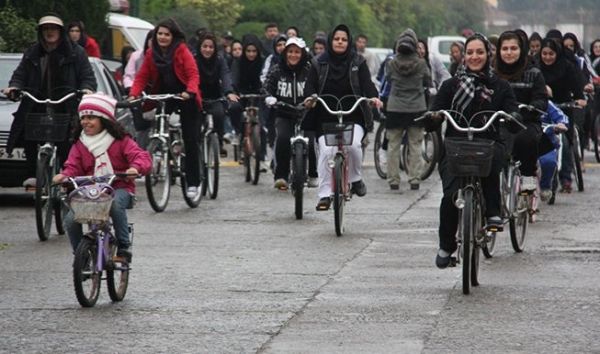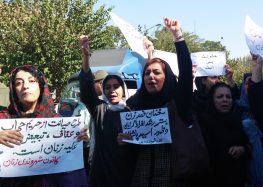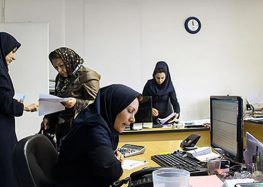Anti-Pollution Initiative Stymied by Ban on Women Riding Bicycles in Public

Women’s rights activists and environmentalists joined forces in the city of Marivan, in Iran’s Kurdistan Province, after a local anti-pollution initiative encouraging people to ride bikes or walk instead of using their cars ran aground when security agents objected to women riding bicycles in public.
“The security forces and powerful people, such as the Friday prayer leader, have turned something as simple as cycling and environmental concerns into controversial issues,” Kaveh Ghoreishi, a reporter specializing in Kurdish affairs, told the International Campaign for Human Rights in Iran. “They are treating citizens like criminals for cycling and arresting them. That’s why the people formed a group on Telegram [messaging service] and protested to the local governor and city council.”
“Despite all the threats, many women showed up at this Tuesday’s bike ride [on August 2, 2016 at Lake Zaribar] and protested by walking with their bikes alongside male bikers,” he added.
On June 13, 2016 Souran Hosseini, chairman of the Marivan City Council’s Cultural Committee, said residents should walk or ride bicycles instead of driving cars to reduce pollution. He also announced the formation of the “Lake Bike Riders” group to encourage cycling trips to nearby Lake Zaribar every Tuesday.
However, on Tuesday, July 26, security agents stopped and detained a number of women cyclers in the city. The women were released the same day after providing written pledges to not ride bicycles anymore.
“It is a sin for women to ride bicycles in public, and the officials, including the sports authority, should provide suitable covered areas for women [to ride bicycles],” said Marivan’s Friday prayer leader Mamousta Mostafa Shirzadi in his sermon on July 29.
A group of concerned residents protested the ban by creating a public page on the popular messaging application Telegram. The page gathered some 1,400 signatures between July 31 to August 3 in support of women’s cycling before the owners shut it down.
In a letter addressed to local officials posted on the Telegram page, supporters of women cyclists said: “While in Tehran, the vice president for women’s affairs is fighting for gender equality. In Marivan, women are unlawfully banned from riding bicycles.”
Located 1.9 miles west of Marivan, Lake Zaribar (also known as Zrebar or Zerivar) is listed as an Environmental Heritage Site by Iran’s Cultural Heritage Foundation and is a major regional attraction. In recent years a sharp drop in the lake’s water level and a number of forest fires in the surrounding hills have worried environmentalists.
The city council’s initiative to organize “Car-Less Tuesdays” by encouraging bike rides to the lake was seen as an opportunity not only to reduce automobile pollution, but also to raise awareness about the lake. But with the ban on women cyclers, matters have taken a different turn.
Environmentalists Meet Women’s Rights Activists
The residents of Marivan have a distinguished record in promoting environmental issues. The Chya Green Society in particular has been one of the most successful environmental groups in the country. Established in Marivan in 2002, Chya has been recognized by Iran’s Environmental Protection Organization as one of the best groups of its kind in the country.
“We have been active in the environmental field for many years,” a Marivan activist, who asked for anonymity, told the Campaign. “We want people to be sensitive to the environment around them. Women are an important part of any environmental action because of their strong, nurturing role. Our work is not political, but when part of the political establishment tries to prevent people from taking positive action to protect the environment, naturally we will react and protest.”
The Chya Green Society, along with other local civil society groups, namely the Rownan Society, the Ghahjin Cultural and Artistic Group, the Marivan Cultural and Literary Group and the Ney Cultural and Literary Group, signed a joint letter supporting women cyclers.
“As representatives of cultural, social and environmental groups in Marivan, we support the right of all members of the public, women as well as men, to ride bicycles. We consider this a worthy athletic, cultural and social activity aimed at expanding communal sports. We also express our opposition to the actions by the police and security forces in banning women cyclers and arresting them and confiscating their bikes. We want there to be a more cultured and considered attitude towards these kinds of activities,” said the letter.
The letter also called on people, members of Parliament, and other officials to show more support for Marivan’s Car-Less Tuesdays initiative. Already, the city of Sanandaj, the capital of Kurdistan Province, has agreed to repeat the initiative.
Revolutionary Roadblocks
After the 1979 Iranian revolution, women were banned from participating in many sports under the banner of Sharia (Islamic) Law. In the first half of the 1980s, women’s sports went unmentioned by the country’s mass media outlets.
For many years after that, the state-run Islamic Republic of Iran Broadcasting (IRIB) television station touched on the topic only by airing brief reports about women’s sports—always without any images. The Islamic Republic’s ruling elite claimed they were concerned about women’s appearances and activities in public, and strictly enforced compliance with the compulsory hijab law.
Female athletes’ outfits became a particularly sensitive issue, so much so that Iranian authorities still prevent the country’s female athletes from participating in some international sports competitions.
The emergence of social media has provided Iranians with an opportunity to express their frustration with official policies towards women and sports; the campaign in support of women cyclers in Marivan is the latest example.
Many political and cultural obstacles nevertheless remain. Several senior Shia theologians in the holy city of Qom have issued religious decrees forbidding women from riding bicycles. Yet there is no legislation or mention against the activity in Iran’s New Islamic Penal Code.
“It is not forbidden for a girl to ride a bike in the courtyard inside her home, even for ten hours,” said Ayatollah Ahmad Alamolhoda, the ultra-conservative Friday Prayer leader of Mashhad in a sermon on June 10, 2011. “But if this girl rides her bike in the alley, her dress and movements will corrupt society.”
Despite these roadblocks, women have been able to make some achievements in athletics. This year nine women succeeded in joining Iran’s Olympic team in Rio de Janeiro.
On April 16, 2016, a cycling track was built exclusively for women in the southeastern city of Yazd, despite opposition from security agencies and religious factions. Some of the more moderate figures in the Islamic Republic have meanwhile publicly spoken in favor of women’s sports, including former President Akbar Hashemi Rafsanjani, the chairman of the Expediency Discernment Council.
“Some backward elements think sports oppose women’s nature. This is inconsistent with Islamic thought,” said Rafsanjani in a speech on August 1, 2016.
President Hassan Rouhani has also spoken in favor of women’s participation in sports. “All officials should work together to provide the necessary grounds for our women, girls and sisters to participate in sports in a secure and healthy environment,” he said in a speech on March 15, 2016.





